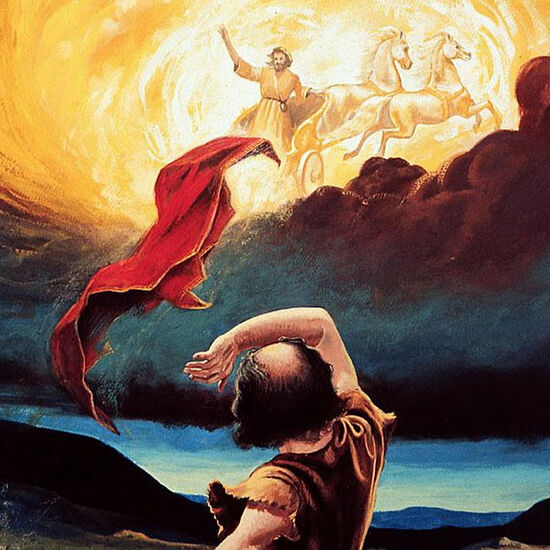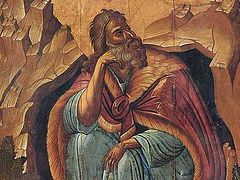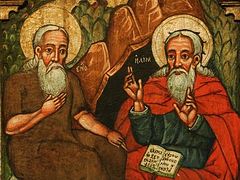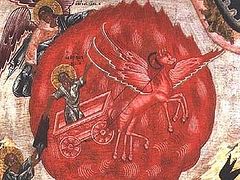Question 4: Some have accused Elias the Prophet of cruelty because he gave two captains of fifty and their subordinates over to Heavenly fire (4 Kg. 1:10-12).
Those who accuse the Prophet wag their tongue against God and His Prophet, because it was He that sent the fire. Therefore, it’s extremely bold to be indignant at the Divine economy. For it’s necessary to know the truthfulness of God’s providence, to know that God lawfully punishes those who sin and blesses those who please Him. It’s clear that the captains and their subordinates were in agreement with the intention of the king who sent them, which is why they suffered punishment from God, and why the third captain, adorned with modesty and faith, having experientially learned the power of the Prophet, turned to him with words of meekness and escaped punishment.
Question 6: Whom does the Divine Scripture calls the sons of the prophets (4 Kg. 2:3)?
… This point makes it clear that there were many prophets. Living in Jericho and Bethel, the prophets foreknew and foretold the great Elias being taken into Heaven. The glorious Elisha, the first among all the prophets, also knew of it. Therefore, he told them: Yea, I know it; hold ye your peace (4 Kg. 2:25). The number of the prophets was so great that fifty followed Elias and Elisha from afar, and after the great Elias was taken up, the prophets gathered and persuaded the successor of grace to send several of them to seek a common teacher. And he sent fifty armed ones—for the author called those sent “strong men” (4 Kg. 2:16-17).
Question 7: Why, when Elisha asked a double portion of grace, did the great Elias say: Thou hast asked a hard thing (4 Kg. 2:10)?
He said this not out of miserliness to communicate grace to his disciple, but out of care for the whole of mankind. Since he himself punished the wicked with hunger, which lasted three years and six months, then it was necessary for the inheritor of extra grace to work more profound miracles. One of them was the punishment of starvation. Therefore, desiring to spare the people, he said: Thou hast asked a hard thing. And we learn this from history, because under Elisha, a seven-year punishment was imposed upon the people.
Question 8: How ought we to understand what is said: My father, my father, the chariot of Israel, and the horsemen thereof (4 Kg. 2:12)?
The kings of other nations used horses and chariots in war. Therefore, Elisha called the great Elias the chariot and horseman of Israel, because he alone was enough to smite the enemies and grant victory to his kinsmen.
Question 9: How ought we to understand what is said: Where is the LORD God of Elias (4 Kg. 2:14)?
Intending to cross the Jordan, the Prophet [Elisha] imitated his teacher and struck the water with his mantle, without saying anything, thinking that his mantle was enough to work a miracle. As the nature of water didn’t obey him, he called upon the God of his master, unseen and inaccessible to man.
Question 11: What does it mean when it says And Mesha king of Moab was a sheepmaster (4 Kg. 3:4)?
… It was said of Elisha in praise of him that he poured water on the hands of Elias (4 Kg. 3:11). How amazed they were by the great prophet! And the need of the wicked kings forced them to resort to the glorious Elisha…
Question 14: About whom did the woman say: Thy servant my husband is dead; and thou knowest that thy servant did fear the LORD (4 Kg. 4:1)?
Some say it was Obadiah, the governor of Ahab’s house, who, having sheltered a hundred men in two caves, fed them with bread and water and went into debt to take care of them. But the power of the prophets, wherewith they multiplied what little there was to provide means of subsistence, is worthy of wonder. For the great Elias made the smallest amount of flour and oil to last for a long time, and the one who received his double grace, commanded another widow to fill a large number of vessels with a small amount of oil, and paid off her husband’s debt and fed her and her children…
Question 23: Why, having foretold the death of Benhadad to Hazael, did the Prophet tell Hazael to say: Thou shalt certainly live (4 Kg. 8:10)?
The God of all commanded the great Elias to anoint Elisha as a prophet, Hazael as king of Syria, and Jehu as king of Israel. Elias anointed Elisha as was commanded, but not the kings, because he was soon taken to Heaven. But Elisha, having received special grace from Elias, first went to Damascus to anoint Hazael…
Question 31: What does it mean: The LORD laid this burden upon him (4 Kg. 9:25)?
Prophecies were called visions and burdens. Some of the prophets saw something either in dreams or in waking states, and this type of prophecy was called a vision; while others spoke and foretold the future by the action of the Spirit of God in them, and these were called burdens. Thus, Jehu recalled the prophecy of the great Elias that where the dogs would lick the blood of Naboth, there they would lick the blood of Ahab. Therefore, he also ordered the body of Joram to be thrown there. And when he learned that Jezebel’s body was also eaten by dogs, he marveled at the truth of the prophecy. For it was said: In the portion of Jezreel shall dogs eat the flesh of Jezebel (4 Kg. 9:36)…
***
Chapter 21:
… The Lord pronounced sentence upon Ahaziah through the great Elias. But the Prophet came not in the flesh, but informed him in writing of the Divine determination. It is said: And there came a writing to him from Elias the prophet, saying, Thus saith the Lord God of David thy father, Because thou hast not walked in the ways of Jehoshaphat thy father, nor in the ways of Asa king of Judah, But hast walked in the way of the kings of Israel, and hast made Judah and the inhabitants of Jerusalem to go a whoring, like to the whoredoms of the house of Ahab, and also hast slain thy brethren of thy father’s house, which were better than thyself: Behold, with a great plague will the Lord smite thy people, and thy children, and thy wives, and all thy goods: And thou shalt have great sickness by disease of thy bowels, until thy bowels fall out by reason of the sickness day by day (2 Chron. 21:12-15)…
The disease of the bowels also struck Joram according to the prophecy of Elias, and after his death he wasn’t honored with a royal burial. For it is written: And his people made no burning for him, like the burning of his fathers… And they buried him in the city of David, but not in the sepulchres of the kings (2 Chron. 21:19-20). It’s truly a fearful thing to fall into the hands of the living God! For as His mercy is unspeakable, so is His punishment unbearable.




